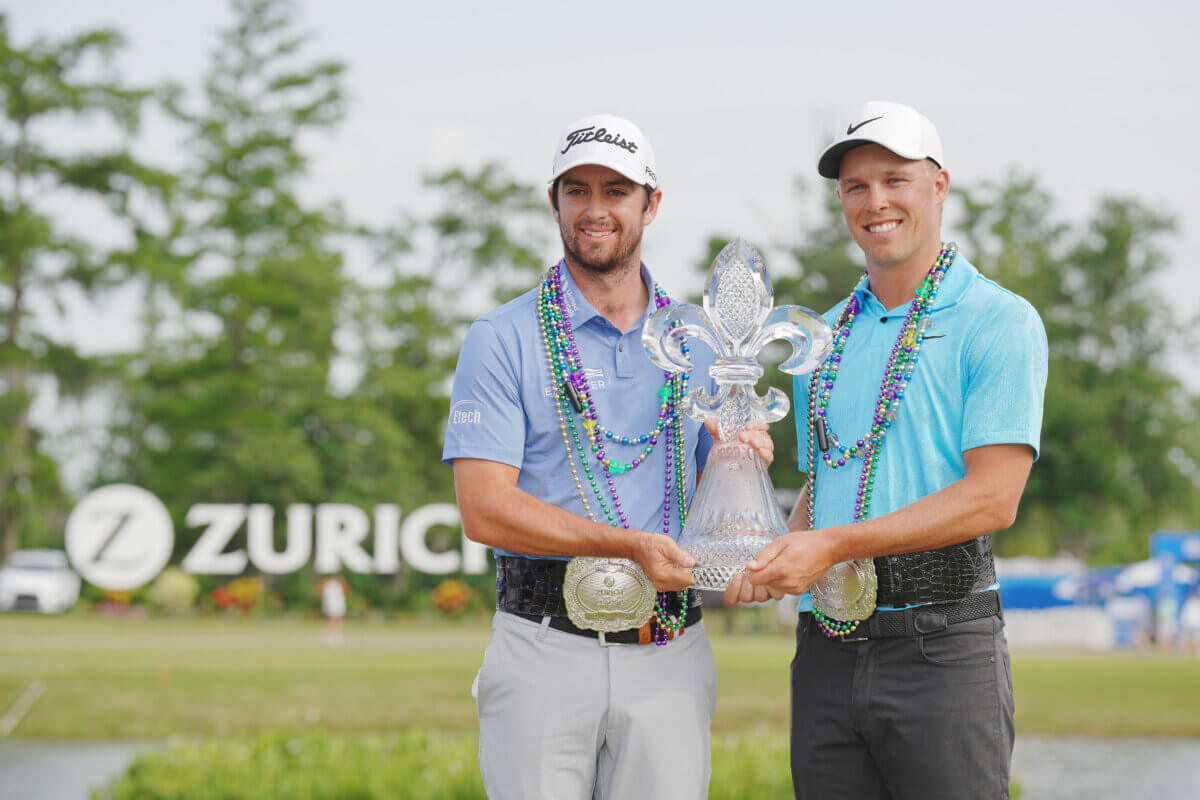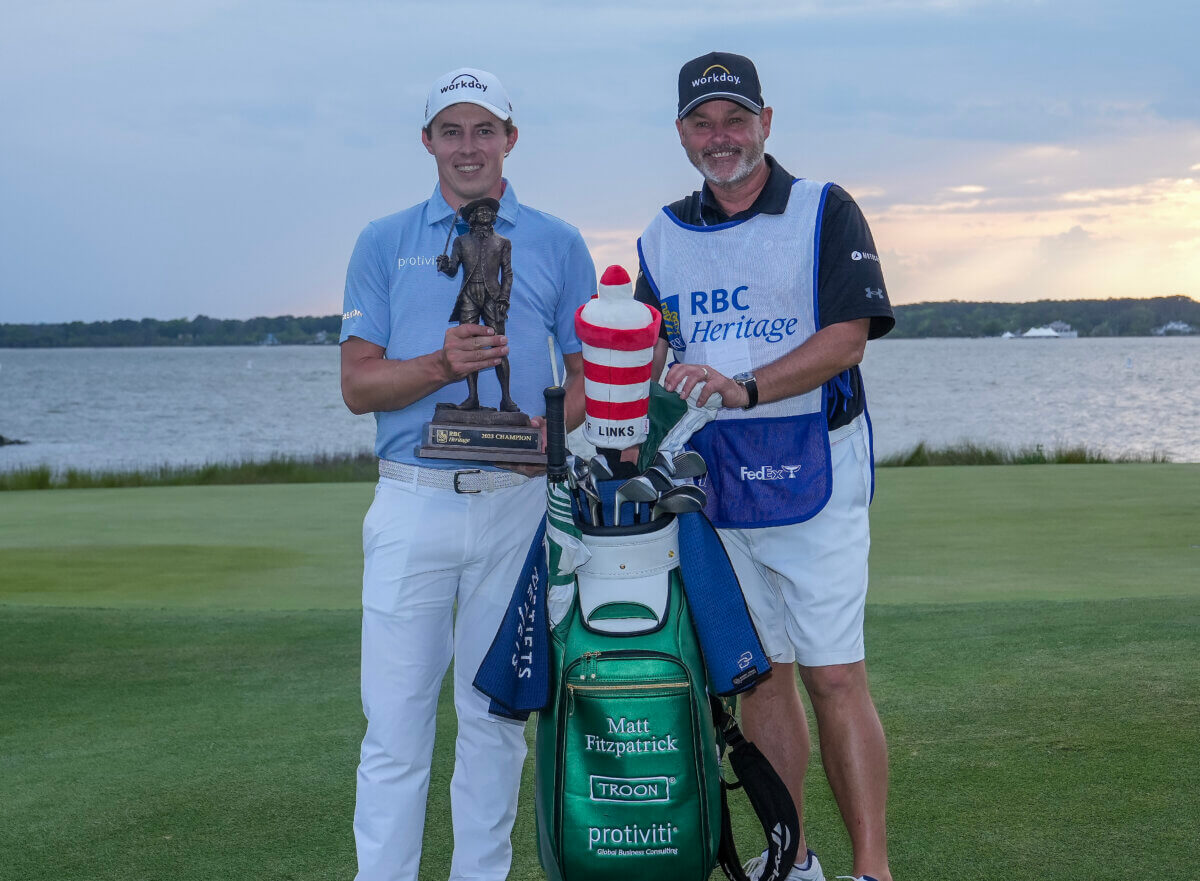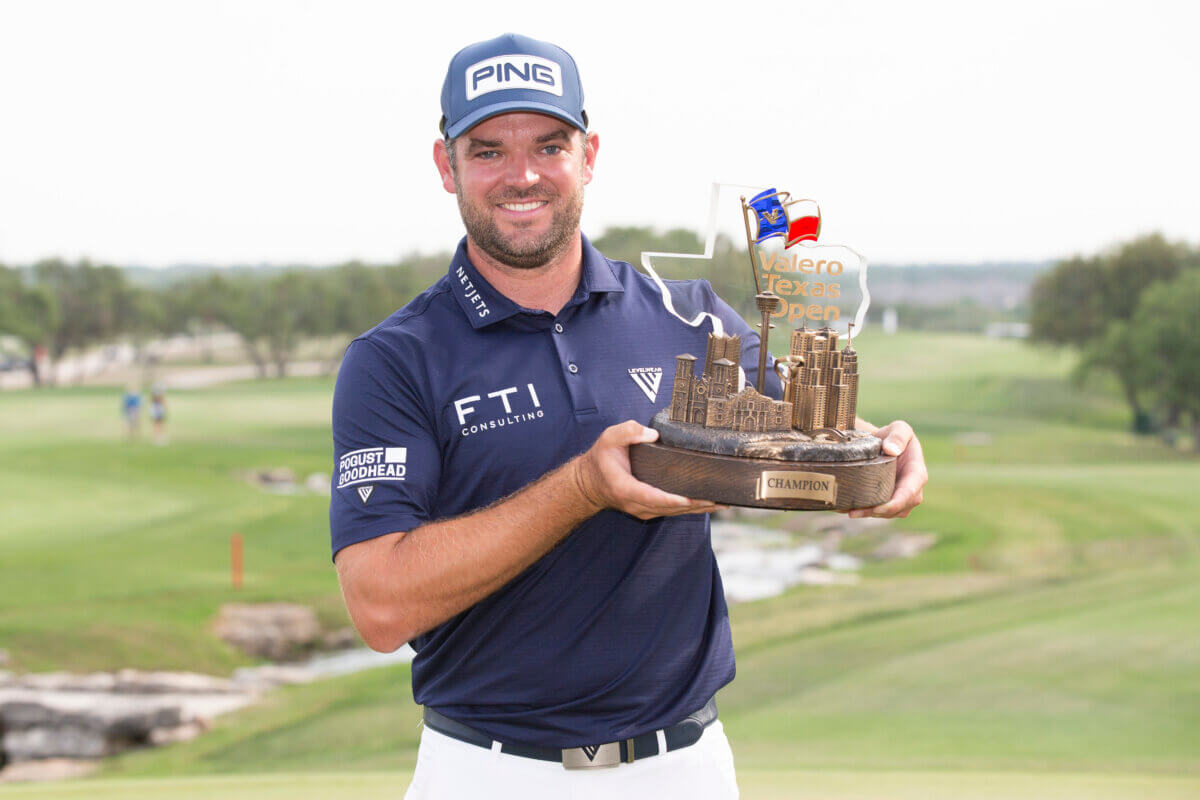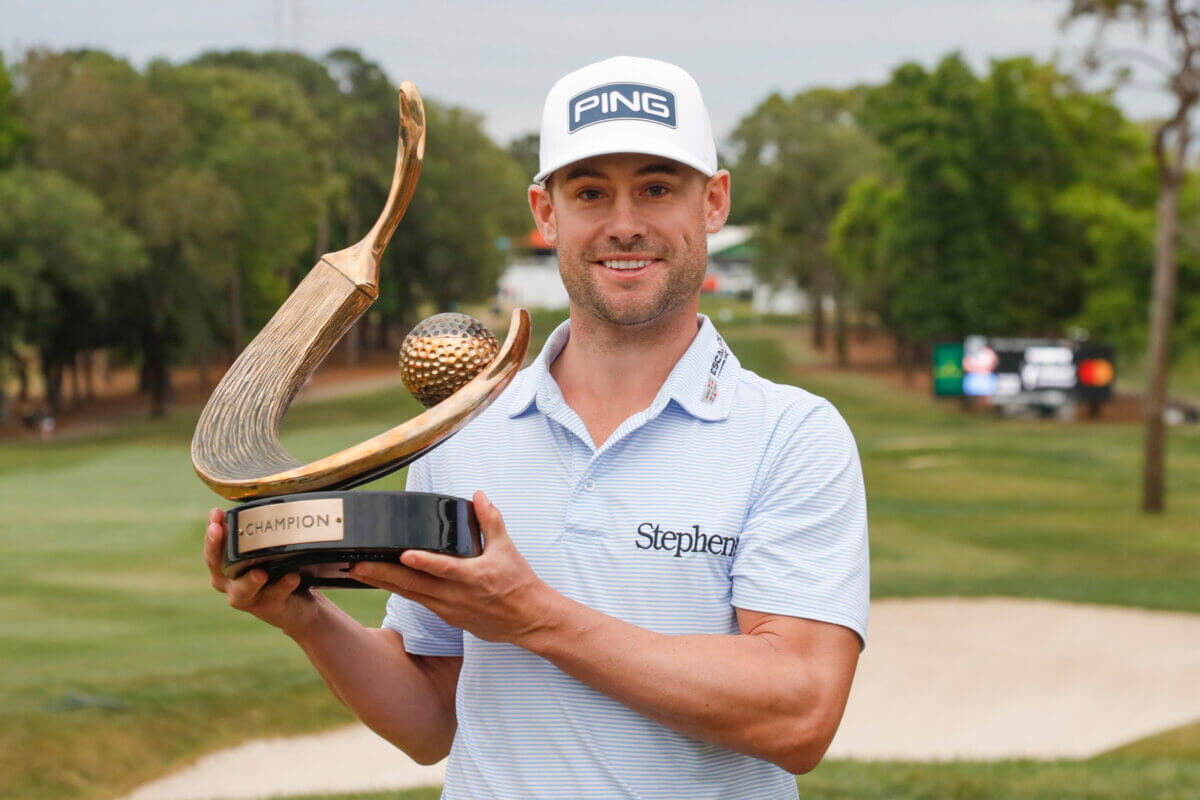TCN Exclusive: Caddie Ronan Flood Q&A on return to Carnoustie
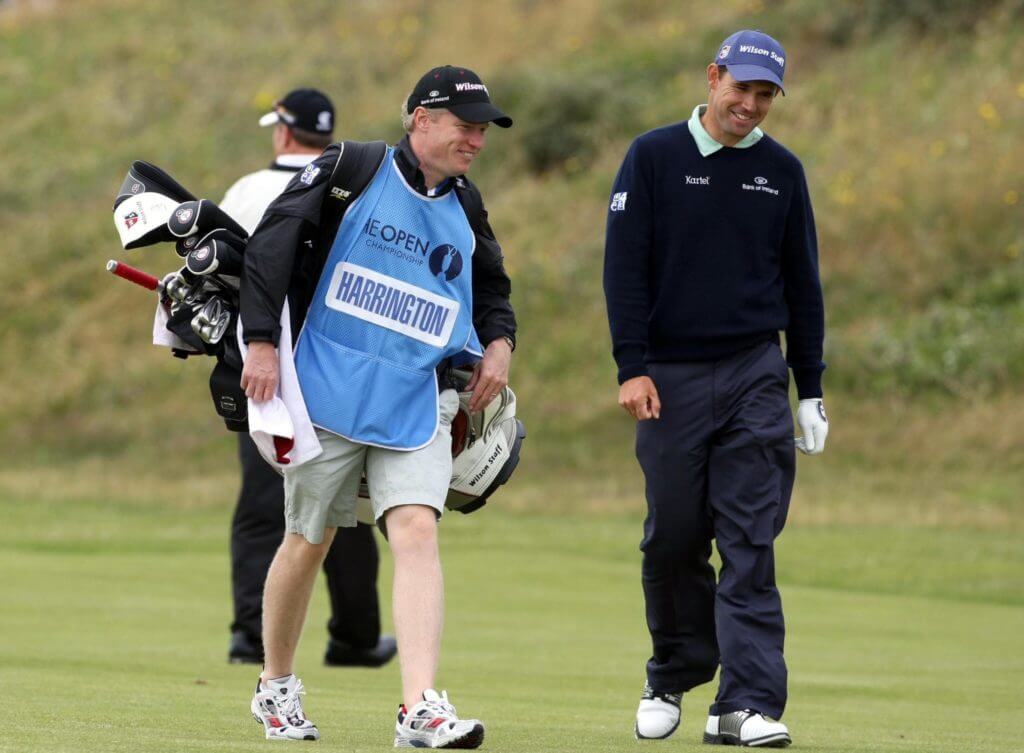
This will be a special week for caddie Ronan Flood.
Every Open Championship is special, but this 2018 edition – the 147th overall – has that extra something because of the venue: Carnoustie.
It was at Carnoustie in 2007, where Flood was on the bag for Padraig Harrington when the Irishman won his first major title.. he’d win two more over the next 13 months.
Harrington was tremendous in that final round. He began the day trailing 54-hole leader Sergio Garcia by six strokes but fired a 4-under 67 on Sunday – which included a double bogey at the 72nd hole – before downing Garcia in a four-hole, aggregate score playoff.
This week, the Open returns to Carnoustie for the first time since Harrington’s 2007 triumph. And, once again, Flood – Harrington’s brother-in-law (the boss and bagman are married to a pair of sisters) – will be on the bag, just as he’s always been.
The Caddie Network (TCN) caught up with Flood to learn more about what that 2007 experience was like as well as how much he’s looking forward to the week ahead.
TCN: I bet it’s hard to beat that experience of caddying a player to victory in the Open Championship. What was it like to be a part of that at Carnoustie in 2007?
Flood: I started caddying for Padraig in May of 2004. I remember the Open in ’04 — he had told me beforehand that there was nothing like it in the Open coming down the stretch, especially the last hole, walking into that stadium. You’ve got the stands; the marshals allow the fans to follow up behind the final group almost completely enclosing the hole. The weekend of an Open, it’s hard to beat that atmosphere.
As it turned out, we missed cut in ‘04, didn’t play in ‘05 because his dad had recently passed. Then we missed the cut in 2006 at Liverpool. So, 2007 was really the first time I was able to experience what Padraig had described in 2004.
And let me say this – it was so stressful. Padraig said it was a great walk, but at that moment it wasn’t one I could enjoy. Winning it the way he won was incredible. He played a great 17 holes and we went to the 18th tee in regulation at 6 under for the day. But, 18 was tough and he needed a great up and down to make double bogey. It was an all-time great double bogey that we didn’t realize at the time would be just enough to get in a playoff. Winning was so exciting and started a roll where he won 3 majors very quickly. But, in the moment with everything that’s going on around you, you don’t appreciate it as much.
TCN: You’ve been on the bag for Padraig for a lot of great rounds over the years. Where does that Sunday 67 rank to get into a playoff on a day when he began the round six shots off the lead?
Flood: When he finished and holed the putt for double on 18, whatever happened in terms of last couple of the groups, it was the best I’d ever seen him play. It was so good that it was one of those rounds that could have been much lower. He played really well, very solid, missed a good chance on 16. It was right up there as one of the best rounds I’ve seen him play — and to this day, considering the situation.
TCN: In terms of career highlights, of which there have been many, where does that victory at Carnoustie rank for you?
Flood: I think that has to be No. 1. It was his first major win. The way he won it. It looked like he’d thrown it away and then it was an unbelievable playoff. It was the highlight of my life. Birkdale was great the following year (which they won) and also the PGA in Detroit (which they won at Oakland Hills). But Carnoustie was first with the way he won.
The thing about the Open is it’s so close to Ireland. When he holed the winning putt, there was a huge amount of Irish there. That is the highlight of my caddying career. It would be hard to beat that even if he won another one now.
TCN: We always hear about how difficult Carnoustie is. It even has the moniker of “Car-nasty.” What makes it so difficult?
Flood: It’s a good, solid golf course. You take on trouble at some stage with the way the bunkering is. Each hole, you’re making decisions. It’s hard to lay up with the trouble. You need to be aggressive at times. Everyone fears holes 16-18. Nothing is over until you’re through those holes and we’ve seen that play out many times. You can be going well, but you just know they’re there waiting for you. We’ve seen so much trouble there over the years. They can cause a disaster.
TCN: Do you think Carnoustie is the most difficult course in the world?
Flood: It’s not necessarily the most difficult, but it’s definitely one of the more daunting. You know going out on the first that the closing stretch is waiting for you.
We play it as part of the Dunhill Links rotation. There, they start off both tees. If you start on 10, it’s not that bad. But starting from one – like we will in the Open – it’s one of the more daunting courses in the world.
I think it’s fair in a lot of ways. If you play well, you can shoot a score – like Padraig’s 6 under through 17. During Dunhill, it’s a little softer, but it’s a fair test. There are other courses where they’re not so much fair and brutally tough. I caddied around Oakmont in the 2007 U.S. Open and I thought that was the toughest I’d ever seen. It was bordering on unfair.
TCN: Is there anything you remember telling Padraig at any key moments that week?
Flood: We had a long talk the night before the final round, just to sit down and go over our strategy. On No. 14, the par 5, there’s a bunker on the right that’s 270 out. If you get it past there, the green is well in range to hit in two. It’s the tightest drive on the course, but if you’re chasing and need an eagle, you hit driver.
We decided to hit a 5-wood. I gave him that club and he said, “OK.”
Padraig doesn’t look at leaderboards. At that point, he was tied for the lead. Andres Romero was up there, maybe tied with him at the time. We hit 5-wood. The crowd was buzzing, but he didn’t know where he was.
But he knew if we hit 5-wood he was near the lead.
When he hit it in the burn for a second time on 18, he had gone quiet. He said himself that he was embarrassed.
I tried to keep him in the moment. It was stuff we worked on many times in the past. Keep talking and remind him it wasn’t over. All the usual clichés. He didn’t say much, but then started chatting to me and got back into playing mode.
I said, “let’s get up and down and see what happens.”
It’s easy to spiral down with a 7 or 8. Padraig himself credits me with getting him out of the hole. I’ll take the credit. If you ask him, that’s the most pivotal moment of the tournament. He thought he lost the Open with the after the water balls. But I had to keep reminding him it’s not over until we finish out and the other groups have to finish too.
Let’s make the best score we can and see what happens.
TCN: Was there anything about Padraig’s demeanor that week that was different from others and gave you a sense that something big was going to unfold?
Flood: At that stage – in 2006 he won order of merit in Europe – he was a top-10 player in the world. I know he hadn’t won a major, but he had reached the point where people were talking about him in the argument for “best never to have won a major” at that stage.
We played in Ireland on a links course the week before. It was a small tournament and we won. We came into that 2007 Open immediately after winning on a links course.
I suppose it was a period where he was one of the better players around. He had a chance at Winged Foot in 2006. Monty was behind us there. We were third or fourth to last group. He played great but bogeyed the last three.
In other words, he didn’t turn up out of the blue at the 2007 Open. It was a progression and getting ready and being patient and letting it happen. And it all came to a head in that final round because he played exceptionally well on Sunday.
TCN: So, you guys get into the playoff with Sergio Garcia. I’m sure the nerves are high. And then Padraig immediately birdies the first hole in the four-hole playoff and Sergio makes bogey. Did that do anything to settle the nerves a bit?
Flood: To be honest, it wasn’t that it was…. The fact that we got into a playoff, we felt good. We went into the playoff feeling good. It might sound crazy, but Padraig wasn’t that nervous. In the small tournament the week before in Ireland, he also won that in a playoff. There was a lot the week before that made us feel good about this playoff.
I remember it was getting late and cold. The temperature dropped, and the ball wasn’t going as far as it did earlier in the day.
On the first playoff hole, we hit a three-quarter 7-iron for a second shot. We would have hit some sort of 8 iron an hour earlier. We weren’t nervous in that sense, because we were back in business. It wasn’t, “oh my God we’re in a playoff for the Open!”
Whatever nerves were there had vanished after 18 in regulation. Going out for the playoff it was more, “we’re back in business.”
TCN: What was it like to get your hands on the Claret Jug?
Flood: Fantasy.
It was a great buzz that night. We had a quiet-ish night on Sunday and then a huge night Monday in Dublin. There’s a good friend of Padraig’s who has a sporting club in Dublin. He threw a party where it was all friends and family and we really enjoyed it.
Good time there.
TCN: Lastly, how much are you looking forward to being back at Carnoustie this week?
Flood: It’s going to be great to get back for an Open.
It’s a much different buzz for the Open than Dunhill. We were there in May for a day with Wilson. The stands were half up.
But it’ll be great to be back there and it will bring back memories of 2007.



